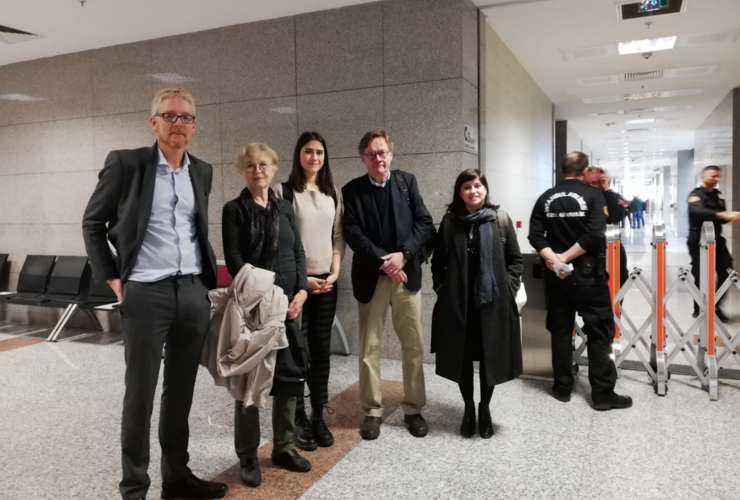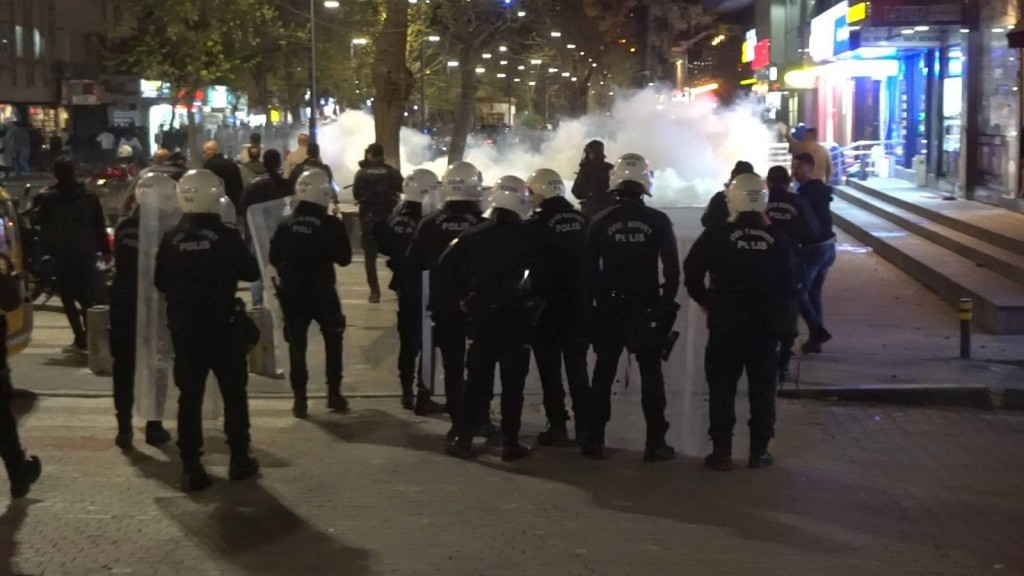On November 28, an International Press Institute (IPI) delegation spent a day in Istanbul’s Justice Palace to monitor four different journalists’ trials. The cases reflected the breadth of Turkey’s ongoing crackdown on the press.
Trial in absentia
Our first court hearing was due to start at 9.05 against Can Dündar, former editor of the secular daily Cumhuriyet, now living in exile in Germany after surviving an assassination attempt that took place outside these same courts in May 2016. He was famously prosecuted for allegedly revealing state secrets in a 2015 article that exposed the arming of Syrian militants by Turkey’s secret services. After 92 days in jail, he was released following instructions from the Constitutional Court in February 2016, but the case remains ongoing.
On this morning he was facing charges of terrorist propaganda for participating in a solidarity campaign for the newspaper Özgür Gündem in the summer of 2016. The hearing lasted no more than five minutes as the judge noted that a translation of the indictment into German had been completed and could now be sent to the German Ministry of Justice to enable Dündar to make a statement to the court from Germany. The case was adjourned to May 21, 2020. Dündar’s lawyer, Abbas Yalçın, noted to IPI that his client was being prosecuted in eight separate trials facing a variety of charges ranging from insult and defamation to espionage.
The IPI trial monitoring delegation consisted of Kari Huhta, an IPI member and former foreign editor of the leading Finnish daily Helsingin Sanomat; Asli Ece Koçak of the Turkey-based Media and Law Studies Association; and IPI’s Renan Akyavas and Oliver Money-Kyrle. The delegation also met up with Marta Barcenilla, vice-president of the European Federation of Journalists and Tim Dawson, board member of the National Union of Journalists (UK) both guests of the Journalists Union of Turkey (TGS) and Erol Önderoğlu of Reporters Without Borders.
Prosecuted for a solidarity campaign
A half hour after the Dündar hearing we attended another Özgür Gündem case where journalists Eren Keskin, Necmiye Alpay and Inan Kizilkaya appeared on behalf of nine defendants facing terrorist propaganda charges for their participation in the same solidarity campaign, “Editors-in-chief on Watch”.
Özgür Gündem was a bilingual Kurdish-Turkish newspaper facing multiple prosecutions in 2016 as it came under intense pressure over its reporting on minority rights in the Kurdish-populated southeastern region. In response, a number of Turkey’s most prominent journalists participated in a solidarity campaign by taking turns to take on editorial responsibility for a day. The campaign ran from May and August 2016 when the courts ordered the paper’s closure. Since then 38 participants in the campaign have faced terrorist propaganda charges in trials lasting over three years.
Today, the defendants were expecting to hear the summing up of the prosecution’s case as the hearings approach their end. They were left frustrated, however, by the absence of the chief prosecutor who, the court was informed, had taken annual leave.
In an emotional appeal to the judges, defendant Eren Keskin pleaded for a final resolution of the case, claiming that the dragging out of proceedings over three years was a violation of their right to a fair trial and amounted to judicial bullying to prevent defendants from resuming their lives while a Sword of Damocles remained hanging over them.
The case was adjourned to January 13, 2020.
Hrant Dink murder: Still waiting for full justice
Our next case was a trial into the killing of Turkish-Armenian journalist Hrant Dink by a teenage nationalist in January 2007 that had been re-opened following investigations into the alleged complicity of the security services. A cross-examination was taking place between defendants in the court room and witnesses in Samsun city through the SEGBIS video conferencing system. They were being questioned over a photo taken of the murderer, Ogün Samast, with police officers and a Turkish flag at the Samsun police center shortly after the killing.
Notorious Article 301 at work
The last case we attended was against six defendants working for the Özgürlükçü Demokrasi newspaper launched after the closure of Özgür Gündem in August 2016. They were charged with denigrating the Turkish nation according to the notorious Article 301 of the Turkish penal code. This took place in the 2nd Criminal Court of first instance and as a more junior court it was presided over by one judge instead of the customary three.
It was the tenth and final hearing and was attended only by the judge and the defense lawyer. None of the defendants were present. The lawyer made a closing statement in which he appealed for their acquittal, argued that Article 301 was unconstitutional and referred to rulings of Turkey’s own Constitutional Court and the jurisprudence of the European Court of Human Rights in defense of free expression.
Before adjourning to consider her verdict, the judge asked if the defendants would accept suspended sentences, apparently a standard question as defendants can choose to serve out their time instead. The lawyer confirmed that they would.
Three minutes later we returned to the courtroom where the judge handed out five-month suspended sentences to four of the six defendants, Selman Keleş, İshak Yasul, Kenan Kırkaya and Özgür Paksoy. The suspension will last for five years and would be enforced in the event of any further convictions. The other two defendants had their files separated from the case.
Commenting afterwards, the defense lawyer, Özcan Kılıç, told IPI this was considerably more lenient than he had expected noting that last year the same court had delivered sentences of over three years to four journalists from the same paper facing similar charges.
Any conviction for conducting journalism is a shock, but such a discrepancy between sentences for essentially the same crime further underlines the arbitrariness of justice in Turkey. Real justice should be predictable, and the public should be able to predict the likely sentencing for different convictions.
The Justice Palace is a huge modern and imposing building with hundreds of cases running in parallel giving the impression of providing clean and efficient justice to the people. We were granted easy access to the courts and the opportunity to mingle with defendants, their lawyers and their supporters afterwards. Underneath this smooth veneer however the judicial system has been ruthlessly used to hound and silence the government’s critics as has been illustrated in IPI’s latest report, Turkey’s Journalists in the Dock.



